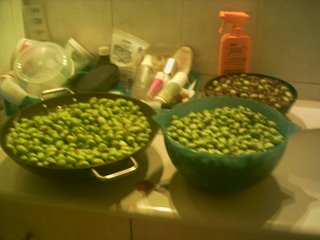
My gentle readers have probably noticed how useful olive oil is in our Tel Aviv kitchen; there's hardly a recipe without it. Olives, and olive oil, are an inseparable part of the Israeli landscape, and often become the symbolic subjects of political struggle over the land.
There is a large, ancient olive tree in my parent's house, which yields "Syrian olives" of the small and bitter variety - the very best, in my opinion. This year the tree was full of fruit, and we decided to pick it and pickle it. My grandpa tried to dissuade us of the plan. A few years back, he had harvested much of the tree, and ended up pickling twenty enormous jars of olives, thinking he would give them out later as gifts. Hah! After a few weeks, no one in their circle of family and friends could bear the sight of olives, not to mention eating them, and the consumption took, well, quite a while.
But we were not convinced, and early on Saturday we charged the tree and started picking fruit. We spread large sheets under the tree and used two methods. First, we beat the branches - vigorously, but not ferociously - with Chad's martial art bamboo swords. Much of the fruit fell to the ground while the branches remained intact. Then, we went over the branches and hand-picked what was left.
That took about three hours.
Then, we had to start sorting the olives; there is a certain fly who stings them and leaves a worm inside the pit. So, we looked for tiny imperfections to examine whether they were fly bites. That took four hours and we hadn't finished by the time the sun set. Gaaaaah! One really learns to appreciate olives after such hard work.
Then, at home, Chad took half the amount of olives and "broke" them. Syrian olives are wonderful when they are cracked; there are various methods to do it, and his enterprising engineer nature led him to use our citrus juicer.
Now, all our olives are happily soaking in water, and will be pickled tomorrow. This is what our bathroom looks like:

What you can't see in the picture is the large bucket of cracked olives, fermenting.
More updates in the following days!
6 comments:
It is harvest time here, as well. I picked the apples I could reach and nearly all the plums on one tree, and just the ones I could get to on the other. Oh, and a round or two of blackberry picking, just from my own yard (a more enterprising person would pick them from some of the public trails, but I hesitate to do so. Perhaps birds want them, from there?)
Picking: about four hours. Canning: two afternoons and counting, and I haven't even gotten to the apples, of which I have a laundry-basket full.
The finished cans look very nice on my pantry shelves...
And I should probably note: I wonder which family planted and tended the olive tree your family enjoys.
Is there any way of contacting them? I assume (because of geography and history) that the land was not sold but rather, occupied - right?
Much of Tivon was unoccupied at the time, and parts of it were cause of struggle between the Zionist settlers, headed by Alexander Zeid, and the local Beduines, headed by Sheik Abrek. Now, they're both buried, side by side, in a historical graveyard on the hill.
Al Jalame, a very small settlement (called a "hirbe"), was very close to Tivon, but the area of Tivon itself, as far as I know, was not densely settled.
Addendum: the struggles between the Zeid Family and Sheik Abrek occurred in the early thirties, when Zeid was posted there as a guard from Hashomer. The land itself was purchased by Kakal.
This one? http://palestineremembered.com/Haifa/al-Jalama/index.html
I grew up on the remains of this one: http://palestineremembered.com/al-Ramla/Zarnuqa/index.html
That's a neighboring village to Tivon, yes, but it was not located where Tivon is. As explained earlier, Tivon was in place long before 1948.
Post a Comment